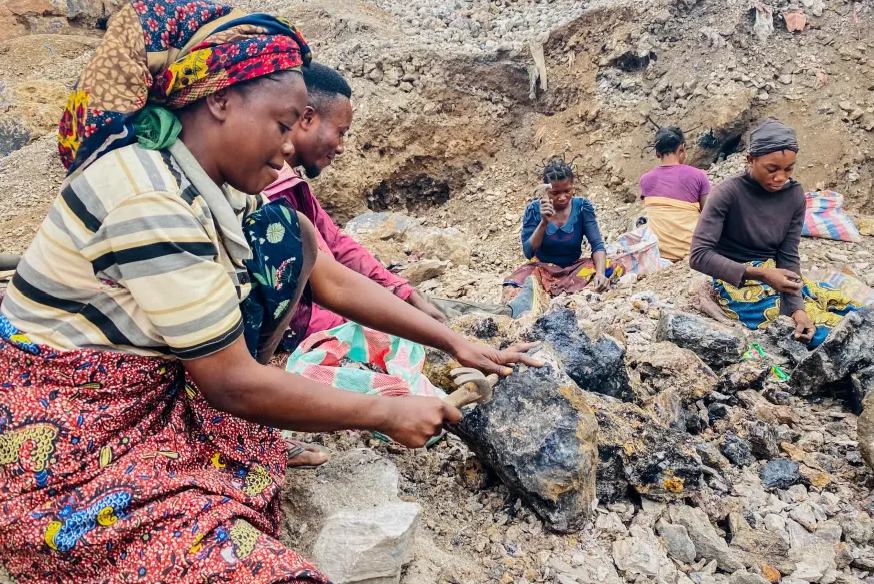
Elena Perez Celis
Nov 12, 2024
As global demand for electric vehicles (EVs) rises, African
countries, particularly the Democratic Republic of Congo (DRC), are positioning
themselves as essential suppliers of the metals required for EV batteries.
However, even well-meaning legislation to improve working conditions and
enforce responsible mining may unintentionally disrupt local communities. With
its commitment to due diligence and compliance, ADD™ recognises both the
opportunities and challenges facing Africa’s mining sector, particularly in
nations rich in minerals like the DRC.
The shift to EVs and sustainable energy solutions has
increased demand for metals like cobalt, which is crucial in the production of
batteries used not only in EVs but also in smartphones, laptops, and e-bikes.
Around 70% of the world’s cobalt comes from the DRC, with a significant portion
sourced through artisanal and small-scale mining (ASM). However, along with
this demand comes greater scrutiny of supply chains to ensure they are free
from child labour, environmental degradation, and human rights abuses.
These issues are central to the challenges in Africa’s
mining landscape. Due diligence laws in regions such as the EU aim to encourage
sustainable and ethical sourcing, but compliance costs can drive investors away
if they become too high, potentially leaving local miners without work—an
unintended effect contrary to the legislation’s goals.
The demand for ethically sourced minerals has pushed
governments and companies to strengthen regulations. In the European Union, the
Corporate Sustainability Due Diligence Directive (CSDDD) requires companies to
conduct thorough checks throughout their supply chains. Compliance is
challenging in complex, multi-layered supply chains, as seen in the DRC, but is
essential for companies aiming to meet the new standards. ADD™ believes that a
more transparent supply chain benefits both the environment and communities in
mining regions.
Senior Managing Director at FTI Consulting, Nicola Cobb,
describes this tension as the ‘E’ in ESG (Environmental, Social, and
Governance) conflicting with the ‘S’. ADD™ understands how demands for both
environmental sustainability and fair labour conditions can create a delicate
balance for companies that source minerals from Africa. While strict
regulations aim to protect workers and the environment, the complexities of
compliance can disrupt the very communities that depend on mining for their
livelihoods.
Increased transparency is now expected across global supply
chains. Both the EU and U.S. regulations, such as the Dodd-Frank Act’s conflict
minerals provision, mandate due diligence to prevent exploitation and
environmental harm. As a partner for companies across Africa, ADD™ sees
firsthand how these rules affect local operators and the broader industry.
Major brands like Tesla, Mercedes-Benz, and BMW have started sourcing cobalt
from alternative locations to manage risk, although recent supply agreements highlight
that companies are still interested in compliant cobalt from the DRC.
The formalisation of the supply chain brings additional
costs, especially to small and medium-sized enterprises in African nations.
Companies working with ADD™ benefit from clear guidance on meeting international
standards while still supporting local economies. ADD™ is committed to creating
sustainable pathways for businesses that not only comply with these new laws
but also invest in local communities, ultimately fostering trust among
consumers and investors alike.
For many businesses, the risks extend beyond legal
requirements. Public opinion and shareholder expectations are crucial in
driving supply chain transparency. In today’s landscape, a negative exposé can
lead to lost sales, shareholder lawsuits, and in severe cases, boycotts. This
reputational risk adds urgency for companies to ensure their supply chains meet
ethical and environmental standards, which, in turn, reinforces their brand
image.
Major corporations, wary of potential fallout, have started
sourcing cobalt and other critical minerals from certified locations. Tesla,
for example, has explored cobalt sources in New Caledonia, while BMW and
Mercedes-Benz have committed to using certified suppliers in Morocco and
Australia. By navigating these complex requirements, ADD™ reinforces Africa’s
role in the global supply chain.
African nations are increasingly calling for greater control
over their natural resources, with the DRC aiming to process cobalt locally to
eventually produce its own EV batteries. To meet global standards, companies
operating in the DRC are encouraged to implement rigorous traceability and
compliance measures, often requiring assistance from international partners.
ADD™ plays a vital role here, facilitating partnerships that support
sustainable practices while empowering local communities.
The DRC has taken steps to make its mining sector more
compliant, focusing on audits and certification processes that eliminate child
labour and illegal mining. A robust compliance framework benefits all
stakeholders, from local miners to global consumers. With ADD™’s support,
companies can create a transparent supply chain that aligns with evolving
regulations and contributes to Africa’s economic growth.
As an essential player in compliance and due diligence, ADD™
recognises the strategic importance of Africa’s mining sector in the global
shift towards sustainable energy. While challenges exist, such as balancing
social and environmental priorities, we believe that through responsible
sourcing and strong partnerships, Africa can continue to meet global demand
while enhancing conditions for local communities.
The path forward requires collaboration across borders. ADD™ remains committed to supporting our clients and partners with the tools they need to achieve sustainable and ethical mining practices across Africa. By fostering responsible investments and building compliance frameworks, we aim to create a future where Africa’s resources benefit all parties involved.
☗The Pitfalls of Quick Fixes: A Cautionary Tale from African Business
☗Introducing Africa's first universal verification Platform
☗Verify Anyone, Anywhere in Africa with ADD™
☗ADD™: Ensuring Security for African Businesses in 2025
☗2024 Africa Investment Forum: $29.5bn in New Commitments for African Projects
☗How the EU Due Diligence Directive Impacts African Businesses
☗Digital Education: A Key to Africa’s Economic Growth
☗What Does Trump's Win Mean for Africa?
☗How ADD™ is Transforming KYC/KYB Compliance Across Africa
☗Botswana's New Mining Law Brings Challenges for Investors
Subscribe to receive our latest posts & updates via email.